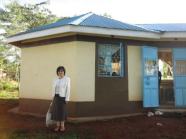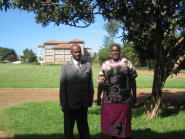|
|
| ABOUT US |
The Process How We Started
In Kenya, primary schools (from 1st grade to 8th grade) became obligatory
in 2003 for the first time. Students don't have to pay the tuition but
there are no lunch service at schools and there are 80~90 students in one
class, especially in the countryside. The students have to share the desks,
chairs, textbooks, notebooks and pens in the classroom of the schools without
electricity and tap water. The students come to school from the long distance
after finishing carrying water from the rivers or picking the twigs for
cooking.
However, thier motivation to study is very high. They eagerly listen to
their teachers talk and copy from the old blackboards or remember the lesson
very clearly. At elementary schools, they are taught in English, so most
children speak English as well as their mother tangue and Swahili language.
I was very inspired by their motivation to study. We decided to build a
school and want to support the youth with providing them the skills of
IT, English, Japanese and agriculture. The school will start from September,
however the computer class slready started.

|
 |
| Suwako Nagata |
Principal
She taught English in Kobe municipal junior high schools for 35 years.
She visited Kenya in 2006 and was inspired by Kenyan youth's motivation
to study.
She met Edward in Kobe in 2008 and started planning NEGAI International
Education Centre. |
|

 |
 |
Hirofumi
Nagata |
Vice- Principal
He is a civil engineer. He is eager to teach agriculture, studying organic
farming.
He will make a demonstration organic farm.
We want to establish an agriculture course later. |
Edward M. Ombajo
&
Ruth Sitati
|
Managers
They are a couple and high school teachers.
They are managers of this school and coordinate many things with local
people.
|
|
|
|
|

